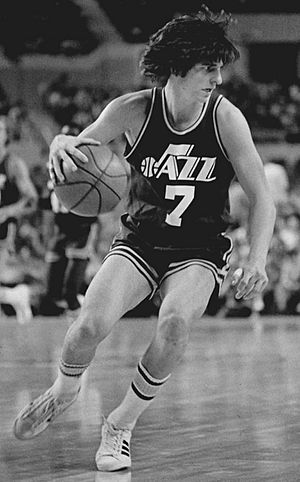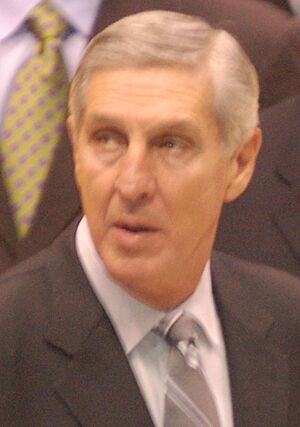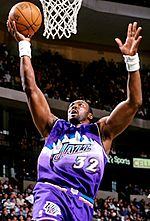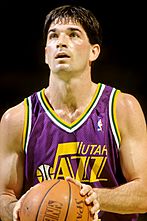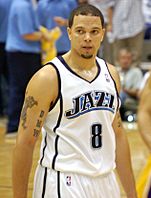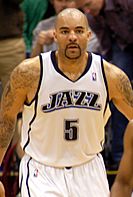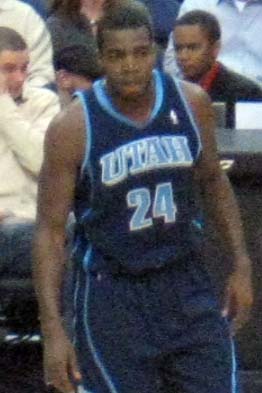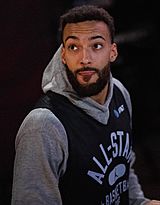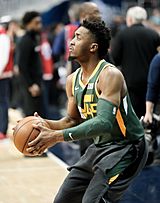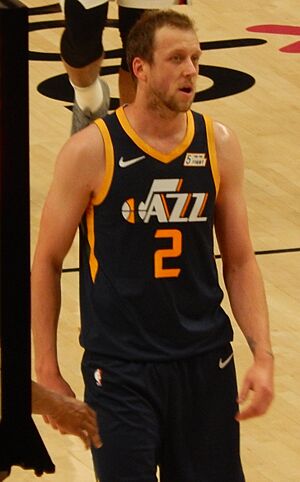Utah Jazz facts for kids
Quick facts for kids Utah Jazz |
|
|---|---|
 |
|
| Conference | Western |
| Division | Northwest |
| Founded | 1974 |
| History | New Orleans Jazz 1974–1979 Utah Jazz 1979–present |
| Arena | Delta Center |
| Location | Salt Lake City, Utah |
| Team colors | Mountain purple, midnight black, sky blue, gray |
| Main sponsor | LiveView Technologies (LVT) |
| CEO | Danny Ainge |
| President | Austin Ainge |
| General manager | Justin Zanik |
| Head coach | Will Hardy |
| Ownership | Ryan Smith |
| Affiliation(s) | Salt Lake City Stars |
| Championships | 0 |
| Conference titles | 2 (1997, 1998) |
| Division titles | 11 (1984, 1989, 1992, 1997, 1998, 2000, 2007, 2008, 2017, 2021, 2022) |
| Retired numbers | 10 (1, 4, 7, 9, 12, 14, 32, 35, 53, 1223) |
The Utah Jazz is a professional basketball team from Salt Lake City, Utah. They play in the National Basketball Association (NBA). The Jazz are part of the Northwest Division in the Western Conference. Since the 1991–92 season, their home games have been at the Delta Center.
The team started in 1974 as the New Orleans Jazz. The name "Jazz" was chosen to honor the city's famous jazz music. On June 8, 1979, the team moved from New Orleans to Salt Lake City.
In their early years, the Jazz struggled. It took 10 seasons for them to reach the NBA playoffs in 1984. After that, they made the playoffs for many years in a row. In the late 1980s, John Stockton and Karl Malone became the team's biggest stars. They formed a famous duo, known for their "pick and roll" plays.
Under coach Jerry Sloan, the Jazz became one of the best teams in the 1990s. They reached the NBA Finals twice, in 1997 and 1998. Both times, they lost to the Chicago Bulls.
Stockton and Malone left the team in 2003. After a few tough seasons, the Jazz improved with point guard Deron Williams. In 2011, coach Sloan retired, and Williams was traded. The team then started to rebuild.
Quin Snyder became the head coach in 2014. With new stars like Rudy Gobert and Donovan Mitchell, the Jazz became a top team again. They had the best record in the league in the 2020–21 season. However, they had disappointing playoff exits in 2021 and 2022. In 2022, Mitchell and Gobert were traded. The Jazz then began a new era, focusing on young players like Lauri Markkanen.
Contents
- Team History
- Season Records
- Home Arenas
- Team Mascot
- Team Logos and Uniforms
- Team Personnel
- Broadcasters
- Head Coaches
- See also
Team History
1974–1979: Starting in New Orleans
On June 7, 1974, the New Orleans Jazz joined the National Basketball Association (NBA) as a new team. The team's first big move was trading for star player Pete Maravich. He was a very exciting player.
The team had problems with their home arenas in New Orleans. They played in different places, and sometimes the court was so high that players needed a net to keep from falling off! The team also faced high taxes and had to play many games away from home during Mardi Gras.
1979–1984: Moving to Utah
The team's owner decided to move the Jazz from New Orleans. They chose Salt Lake City, Utah, even though it was a smaller city. Salt Lake City had a history with basketball, having hosted the Utah Stars before. The team kept the "Jazz" name because there wasn't enough time to change it before the 1979–80 season.
Attendance for the Jazz was a bit lower after the move. This was partly because the move was approved late and marketing was poor. In 1981, general manager Frank Layden became the coach.
By 1983, the team was losing money. They even played games in Las Vegas to try and earn more. But then, the team started to play much better. With players like Adrian Dantley, Jeff Wilkins, Thurl Bailey, Mark Eaton, Rickey Green, and Darrell Griffith, they won their division in 1984. This was the first time the team had a winning season and won a division title.
1984–2003: The Stockton and Malone Era
In the 1984 NBA draft, the Jazz picked a player named John Stockton. Fans at the draft party were not happy because they didn't know him. But Stockton would become a huge star.
The 1984–85 season saw Mark Eaton become a great defensive player. He set an NBA record for blocks per game. In April 1985, Larry H. Miller bought half of the team. This helped make the team more stable.
In the 1985 NBA draft, the Jazz added Karl Malone. He quickly became a key player. In 1986, Larry Miller bought the rest of the team, keeping the Jazz in Utah.
The Jazz traded Adrian Dantley in 1986. John Stockton became the starting point guard in the 1987–88 season, and Karl Malone became one of the best power forwards in the league. The team reached the second round of the playoffs, losing a close series to the Los Angeles Lakers.
1988–1990: Jerry Sloan Becomes Coach
During the 1988–89 season, Frank Layden stepped down as coach, and Jerry Sloan took over. The Jazz won 51 games and their division. Malone, Stockton, and Eaton were all All-Stars. Eaton won Defensive Player of the Year again. However, the Jazz lost in the first round of the playoffs.
In the 1989–90 season, the Jazz had their best record yet, winning 55 games. Malone and Stockton had amazing seasons. But again, they lost in the first round of the playoffs.
1990–1996: Getting Closer to a Championship
For the 1990–91 season, the Jazz added Jeff Malone to the team. This gave them three strong scorers: Karl Malone, Jeff Malone, and John Stockton. They won 54 games and reached the second round of the playoffs.
The 1991–92 season was very successful. The Jazz moved into the Delta Center, a new, modern arena. They won 55 games and their division. In the playoffs, they reached the Western Conference Finals for the first time, but lost to the Portland Trail Blazers.
The 1992–93 season was not as good. The team struggled with injuries. However, Salt Lake City hosted the NBA All-Star Game. In the playoffs, they lost in the first round.
In the 1993–94 season, the Jazz traded for Jeff Hornacek. He fit well with Stockton, and the team improved. They reached the Western Conference Finals again, but lost to the Houston Rockets.
The 1994–95 season saw the Jazz win 60 games, but they lost in the first round of the playoffs. In the 1995–96 season, they reached the Conference Finals for the third time, losing a close series to the Seattle SuperSonics.
1996–1998: Reaching the NBA Finals
In the 1996–97 season, the Jazz had their best record ever, winning 64 games. They won their division and had the best record in the Western Conference. The team included Stockton, Malone, Hornacek, Bryon Russell, and others. Malone won his first NBA MVP award.
The Jazz reached the NBA Finals for the first time. They played against Michael Jordan and the Chicago Bulls. The Jazz lost the series 4–2 in very close games.
The team kept the same players for the 1997–98 season. Stockton was injured early, but the team played well after he returned. They finished with 62 wins and the best record in the playoffs.
In the playoffs, the Jazz beat Houston and San Antonio. They then swept the Los Angeles Lakers to reach the NBA Finals for the second year in a row. Again, they faced the Chicago Bulls. The Jazz won Game 1, but the Bulls took a 3–1 lead. The Jazz won Game 5, but in Game 6, Michael Jordan made a famous shot in the final seconds to win the game and the series for Chicago.
1998–2003: Final Years of Stockton and Malone
The 1999 season was shorter due to a player lockout. The Jazz finished with one of the best records in the league. They won their first playoff series but lost in the second round. Malone won his second MVP award.
In the 1999–2000 season, the Jazz won their division but lost in the second round of the playoffs. After the season, Hornacek retired.
The Jazz had a good record in the 2000–01 season but lost in the first round of the playoffs. This was their earliest playoff exit in a long time.
In the 2001–02 season, Andrei Kirilenko joined the team. The Jazz lost in the first round of the playoffs again.
After the 2002–03 season, John Stockton retired. Karl Malone left to join the Los Angeles Lakers. This marked the end of a very successful era for the Jazz.
2003–2005: After Stockton and Malone
Without their two biggest stars, many thought the Jazz would be one of the worst teams. But they surprised everyone, finishing the 2003–04 season with a winning record. Players like Kirilenko, Raja Bell, and Carlos Arroyo stepped up. Kirilenko even made the All-Star Game. The Jazz just missed the playoffs, ending a 20-year streak.
The 2004–05 season was tough due to many player injuries. The Jazz finished with one of their worst records in years.
2005–2010: The Williams and Boozer Era
In 2005, the Jazz picked Deron Williams in the draft. Injuries continued to be a problem for key players like Carlos Boozer and Andrei Kirilenko. The Jazz just missed the playoffs again.
In 2006, the Jazz drafted good young players like Paul Millsap and Ronnie Brewer. They also traded for veteran Derek Fisher. In the 2006–07 season, the Jazz won 51 games. Boozer and Mehmet Okur became All-Stars. The Jazz reached the Western Conference Finals but lost to the San Antonio Spurs.
The 2007–08 season saw the Jazz win 54 games. They beat Houston in the playoffs but then lost to the Los Angeles Lakers.
The 2008–09 season was affected by injuries to Williams, Boozer, and Okur. The team's owner, Larry H. Miller, also passed away. The Jazz made the playoffs but lost in the first round to the Lakers. Williams became one of the best point guards in the league.
In the 2009–10 season, the Jazz won 53 games. Williams made his first All-Star appearance. They beat Denver in the first round of the playoffs but were swept by the Lakers in the next round. This was their third playoff loss to Los Angeles in a row.
2010–2017: Rebuilding the Team
2010–2013: Changes and New Players
In 2010, the Jazz drafted Gordon Hayward. Key players like Carlos Boozer and Kyle Korver left the team. The Jazz traded for Al Jefferson and signed Raja Bell.
The Jazz also changed their logos and uniforms in 2010, bringing back their classic "music note" logo. The team started the 2010–11 season well, but then longtime coach Jerry Sloan resigned in February 2011. Tyrone Corbin became the new coach.
In February 2011, the Jazz traded star Deron Williams to the New Jersey Nets. This trade brought in young players like Derrick Favors and Devin Harris, along with future draft picks. The Jazz missed the playoffs that season.
2013–2017: The Hayward and Gobert Era
On June 27, 2013, the Jazz acquired Rudy Gobert in a draft-night trade. He would become a very important defensive player.
In 2014, the Jazz drafted Dante Exum and Rodney Hood. Quin Snyder was hired as the new head coach.
The Jazz finished the 2015–16 season just missing the playoffs. But in the 2016–17 season, they won 51 games and made the playoffs. They beat the Los Angeles Clippers in the first round, which was their first playoff series win since 2010. They then lost to the Golden State Warriors. Gordon Hayward and Rudy Gobert had great seasons, with Hayward becoming an All-Star and Gobert making the NBA Defensive First Team.
After the season, Gordon Hayward left the Jazz to sign with the Boston Celtics.
2017–2022: The Gobert and Mitchell Era
2017: Donovan Mitchell Joins the Team
On June 22, 2017, the Jazz traded for Donovan Mitchell on draft night. They also acquired veteran point guard Ricky Rubio.
The Jazz started the 2017–18 season slowly due to injuries. But in the second half, Mitchell became a starter and led all rookies in scoring. The team improved greatly, winning 32 of their last 45 games. They made the playoffs as the fifth seed. They beat the Oklahoma City Thunder in the first round but lost to the Houston Rockets in the second round. After the season, Rudy Gobert was named NBA Defensive Player of the Year.
2018–2020: Regular Season Success, Playoff Struggles
The 2018–19 season started with high hopes. Mitchell struggled early, but his performance improved later in the season. The Jazz finished strong, winning 50 games and earning the fifth seed in the playoffs. They faced the Houston Rockets again and lost the series.
In 2019, the Jazz added several new players like Mike Conley Jr. and Bojan Bogdanović. They also traded away some players, including Derrick Favors and Ricky Rubio. Many people thought these changes would make the team better.
In December 2019, the Jazz traded Dante Exum for Jordan Clarkson. Clarkson quickly became a key player for the team. In January 2020, Gobert and Mitchell were both named All-Stars. This was the first time since 2007 that two Jazz players were selected.
In March 2020, Gobert and Mitchell were diagnosed with COVID-19. This led to the NBA season being stopped. When the season restarted in the "NBA Bubble," the Jazz played the Denver Nuggets in the playoffs. Donovan Mitchell had an amazing scoring performance in Game 1, but the Jazz lost. They took a 3–1 lead in the series but then lost the next three games, losing the series.
After the playoffs, Mitchell and Gobert both signed big contract extensions to stay with the Jazz.
2020–2021: Three All-Stars and Top Record
In October 2020, Ryan Smith bought the Utah Jazz from the Miller family. In April 2021, former NBA star Dwyane Wade bought a part of the team.
The Jazz started the 2020–21 season with a fantastic record. Donovan Mitchell led the team in scoring, and Jordan Clarkson was a top player off the bench. In February 2021, coach Quin Snyder was named the Western Conference All-Star coach. Mitchell and Gobert were named All-Stars again. Later, Mike Conley Jr. was also selected as an All-Star, making it three Jazz players in the All-Star Game for the first time since 1989.
On May 16, 2021, the Jazz finished with the best regular season record in the NBA for the first time in team history. Jordan Clarkson won the Sixth Man of the Year award, becoming the first Jazz player to do so.
In the first round of the 2021 NBA playoffs, the Jazz beat the Memphis Grizzlies. In the second round, they played the Los Angeles Clippers. The Jazz won the first two games at home but then lost the next four games and were eliminated.
The Jazz had a good season in 2021–22, with Mitchell and Gobert again being All-Stars. They finished with 49 wins and made the playoffs as the fifth seed. They lost to the Dallas Mavericks in the first round.
2022–present: After Gobert and Mitchell
2022–present: The Lauri Markkanen Era Begins
On July 1, 2022, the Jazz traded Rudy Gobert to the Minnesota Timberwolves. This trade brought in several players and many future draft picks. On September 1, 2022, the Jazz traded Donovan Mitchell to the Cleveland Cavaliers. This trade brought in Collin Sexton, Lauri Markkanen, and more draft picks.
On June 5, 2022, Quin Snyder resigned as head coach. On June 29, the Jazz hired Will Hardy as their new coach.
On February 2, 2023, Lauri Markkanen was selected as an All-Star for the first time. He was later chosen as an All-Star starter due to other players' injuries. Markkanen also took part in the Three-Point Contest. The Jazz team of Collin Sexton, Walker Kessler, and Jordan Clarkson won the NBA's team skills challenge.
The Jazz made more trades in February 2023, sending away players like Mike Conley Jr. They received Russell Westbrook but then waived him.
The Jazz finished the 2022–23 season with a losing record and missed the playoffs. At the end of the season, Lauri Markkanen won the NBA Most Improved Player Award.
In the 2023–24 season, the Jazz, led by Markkanen, finished with 31 wins and missed the playoffs again. A highlight was Keyonte George being named to the All-Rookie second team. For the 2024–25 season, the Jazz acquired and then waived Russell Westbrook again. They also signed veteran player Patty Mills.
Season Records
Here are the last five seasons for the Jazz. For a full list, see List of Utah Jazz seasons.
| Season | Games Played | Wins | Losses | Win Percentage | Finish | Playoffs |
| 2020–21 | 72 | 52 | 20 | .722 | 1st, Northwest | Lost in conference semifinals, 2–4 (Clippers) |
| 2021–22 | 82 | 49 | 33 | .598 | 1st, Northwest | Lost in first round, 2–4 (Mavericks) |
| 2022–23 | 82 | 37 | 45 | .451 | 4th, Northwest | Did not qualify |
| 2023–24 | 82 | 31 | 51 | .378 | 4th, Northwest | Did not qualify |
| 2024–25 | 82 | 17 | 65 | .207 | 5th, Northwest | Did not qualify |
Home Arenas
- Loyola Field House (1974–1975)
- Municipal Auditorium (1974–1975)
- Louisiana Superdome (1975–1979)
- Salt Palace (1979–1991)
- Delta Center (1991–present)
Team Mascot
Jazz Bear is the team's mascot. He first appeared on November 4, 1994. He often entertains the crowd during halftime by riding onto the court on a motorbike!
Team Logos and Uniforms
- Previous logos of the Utah Jazz
New Orleans Jazz Uniforms
When the Jazz were in New Orleans, their colors were purple, gold, and green. These colors are linked to the famous Mardi Gras in New Orleans. Their uniforms had a "Jazz" script on the chest.
Utah Jazz Uniforms
Mardi Gras Colors: 1979–1996
When the team moved to Utah in 1979, they kept the same colors. They added "Utah" to the logo on the home uniforms in 1986. The road uniforms changed to dark green in 1981, then back to purple in 1984. These uniforms were used until the 1995–96 season.
Purple Mountains: 1996–2004
For the 1996–97 season, the Jazz changed their look. New colors were purple, copper, and turquoise. Their new uniforms featured a picture of the Wasatch Range mountains on the chest. These uniforms were worn until the 2003–04 season.
An alternate black uniform was added in the 1998–99 season. It had the "Jazz" script but no mountains.
In the 2004–05 season, the Jazz changed their colors again to navy blue, powder blue, and silver. The team's logo stayed similar but with the new colors. They had new home and road uniforms with updated "Jazz" or "Utah" scripts.
An alternate powder blue uniform was introduced in the 2006–07 season.
Return of the 'J-note': 2010–2016
On June 15, 2010, the Jazz brought back their classic "J-note" logo and colors. The new uniforms combined old and new styles, using navy blue from recent years but bringing back the gold and green.
An alternate green jersey was unveiled in 2011, similar to their road jersey but with green as the main color.
New Look with Nike: 2016–2022
On May 12, 2016, the Jazz updated their logos and uniforms again. They made their "Utah" wordmark logo the main one. New home and road uniforms were created with a special number font. Two new alternate uniforms were also introduced: a green one and a navy blue one with sleeves.
In 2017, when Nike became the NBA's uniform provider, the Jazz made small changes. They added a gold "Statement" uniform, which featured the navy "J-note" logo.
"Red Rocks" City Uniform: 2017–2022
The "City" uniform was inspired by the red rock formations in Southern Utah. It had a cool color fade from gold to orange, burgundy, and black. After three seasons, the Jazz changed this uniform to a similar design but with the colors fading in the opposite direction.
Earned Uniforms
"Earned" uniforms are special jerseys given only to teams that made the playoffs the season before. The Jazz had a dark green "Earned" uniform in 2019 and a light green one in 2021.
Black and Yellow 'J-note': 2022–2025
The Jazz showed off new uniforms before the 2022–23 season. They brought back the classic 1996–2004 purple "mountain" uniforms as a "City" uniform. They also introduced "Statement" black, "Icon" yellow, and "Association" white uniforms. These new black, white, and yellow uniforms were not very popular with fans.
Modernized Purple Mountains: 2023–Present
Starting with the 2023–24 season, the Jazz announced a new version of the "mountain" uniforms. These have updated mountain designs and a larger "Utah" wordmark.
Between the 2024–25 and 2025–26 seasons, the Jazz are slowly replacing the black and yellow uniforms with the modernized "purple mountains" ones. For the 2024–25 season, they kept the white and black uniforms but added a new black "Statement" uniform with the "J-note" and a purple "City" uniform with the mountain design. The black and purple "Statement" uniform debuted in January 2025. By the 2025–26 season, the Jazz will fully use the "purple mountains" uniforms.
Throwback Uniforms
The Jazz have worn their original "J-note" uniforms a few times. In the 2003–04 season, they wore replicas of the 1986–96 white uniforms to celebrate their 25th season in Utah. In the 2009–10 season, they wore the 1979–1984 green uniforms to honor the 30th anniversary of the move to Utah.
For the 2018–19 season, the Jazz wore a modern version of their 1984–1996 purple uniforms for their 40th season in Utah.
For the 2019–20 season, the Jazz wore a modern version of their 1996–2004 purple uniforms, which they wore during their two trips to the NBA Finals. These uniforms were brought back as a "City" uniform for the 2022–23 season.
For the 2023–24 season, the Jazz wore the original 1974–75 purple uniforms to celebrate the team's 50th anniversary.
Team Personnel
Retired Numbers
The Jazz have honored many important players and coaches by retiring their jersey numbers. This means no other player on the team can wear that number.
| Utah Jazz Retired Numbers | ||||
|---|---|---|---|---|
| No. | Player | Position | Years with Team | Date Retired |
| 1 | Frank Layden | Head coach | 1981–1988 | December 9, 1988 |
| 4 | Adrian Dantley | Forward | 1979–1986 | April 11, 2007 |
| 7 | Pete Maravich | Guard | 1974–1980 | December 14, 1985 |
| 9 | Larry H. Miller | Owner | 1985–2009 | April 14, 2010 |
| 12 | John Stockton | Guard | 1984–2003 | November 22, 2004 |
| 14 | Jeff Hornacek | Guard | 1994–2000 | November 19, 2002 |
| 32 | Karl Malone | Forward | 1985–2003 | March 23, 2006 |
| 35 | Darrell Griffith | Guard | 1980–1991 | December 4, 1993 |
| 53 | Mark Eaton | Center | 1982–1993 | March 1, 1996 |
| 1223 | Jerry Sloan | Head coach | 1988–2011 | January 31, 2014 |
| "Hot" Rod Hundley | Broadcaster | 1974–2009 | January 29, 2010 | |
- The NBA retired Bill Russell's No. 6 for all its teams on August 11, 2022.
Basketball Hall of Famers
Many Jazz players and coaches have been inducted into the Naismith Memorial Basketball Hall of Fame.
| Utah Jazz Hall of Famers | ||||
|---|---|---|---|---|
| Players | ||||
| No. | Name | Position | Years with Team | Inducted |
| 7 44 |
Pete Maravich | Guard | 1974–1980 | 1987 |
| 4 | Adrian Dantley | Forward/Guard | 1979–1986 | 2008 |
| 12 | John Stockton | Guard | 1984–2003 | 2009 |
| 32 | Karl Malone | Forward | 1985–2003 | 2010 |
| Coaches | ||||
| Name | Position | Years with Team | Inducted | |
| 1223 | Jerry Sloan | Assistant coach Head coach |
1985–1988 1988–2011 |
2009 |
Team Leaders
Bold means the player is still with the team. Italics means the player is still active but not with the team.
Points Scored (Regular Season) (as of the end of the 2024–25 season)
- Karl Malone (36,374)
- John Stockton (19,711)
- Adrian Dantley (13,635)
- Darrell Griffith (12,391)
- Thurl Bailey (9,897)
- Andrei Kirilenko (8,411)
- Pete Maravich (8,324)
- Donovan Mitchell (8,234)
- Gordon Hayward (8,077)
- Rudy Gobert (7,592)
- Deron Williams (7,576)
- Derrick Favors (7,336)
- Mehmet Okur (7,255)
- Rickey Green (6,917)
- Jeff Hornacek (6,848)
- Carlos Boozer (6,821)
- Paul Millsap (6,713)
- Jordan Clarkson (5,985)
- Bryon Russell (5,752)
- Matt Harpring (5,640)
- Mark Eaton (5,216)
- Jeff Malone (5,158)
- Joe Ingles (5,094)
- Al Jefferson (4,089)
- Rich Kelley (4,044)
- Lauri Markkanen (3,861)
- Aaron James (3,829)
- Bojan Bogdanović (3,748)
- Alec Burks (3,671)
- Bob Hansen (3,550)
- Jeff Wilkins (3,445)
- Greg Ostertag (3,425)
- Collin Sexton (3,302)
- C.J. Miles (3,264)
- Jim McElroy (3,188)
- David Benoit (3,035)
- Rodney Hood (2,985)
- Mike Conley (2,949)
- Truck Robinson (2,901)
- Ben Poquette (2,873)
- Ronnie Brewer (2,786)
- Howard Eisley (2,779)
- Nate Williams (2,726)
- John Drew (2,670)
- Gail Goodrich (2,582)
- Blue Edwards (2,560)
- Trey Burke (2,547)
- Enes Kanter Freedom (2,475)
- Raja Bell (2,445)
- Antoine Carr (2,307)
Other Statistics (Regular Season) (as of the end of the 2024–25 season)
| Most Minutes Played | |
|---|---|
| Player | Minutes |
| Karl Malone | 53,479 |
| John Stockton | 47,764 |
| Mark Eaton | 25,169 |
| Darrell Griffith | 21,403 |
| Andrei Kirilenko | 20,989 |
| Thurl Bailey | 20,523 |
| Rudy Gobert | 18,301 |
| Adrian Dantley | 17,899 |
| Rickey Green | 17,329 |
| Bryon Russell | 16,443 |
| Most Rebounds | |
|---|---|
| Player | Rebounds |
| Karl Malone | 14,601 |
| Rudy Gobert | 7,119 |
| Mark Eaton | 6,939 |
| Derrick Favors | 4,626 |
| John Stockton | 4,051 |
| Greg Ostertag | 3,978 |
| Rich Kelley | 3,972 |
| Thurl Bailey | 3,881 |
| Andrei Kirilenko | 3,836 |
| Paul Millsap | 3,792 |
| Most Assists | |
|---|---|
| Player | Assists |
| John Stockton | 15,806 |
| Karl Malone | 5,085 |
| Rickey Green | 4,159 |
| Deron Williams | 4,003 |
| Joe Ingles | 2,213 |
| Andrei Kirilenko | 1,919 |
| Jeff Hornacek | 1,895 |
| Pete Maravich | 1,844 |
| Gordon Hayward | 1,762 |
| Adrian Dantley | 1,702 |
| Most Steals | |
|---|---|
| Player | Steals |
| John Stockton | 3,265 |
| Karl Malone | 2,035 |
| Rickey Green | 1,100 |
| Andrei Kirilenko | 960 |
| Darrell Griffith | 931 |
| Bryon Russell | 728 |
| Jeff Hornacek | 618 |
| Paul Millsap | 604 |
| Joe Ingles | 544 |
| Gordon Hayward | 527 |
| Most Blocks | |
|---|---|
| Player | Blocks |
| Mark Eaton | 3,064 |
| Andrei Kirilenko | 1,380 |
| Rudy Gobert | 1,357 |
| Greg Ostertag | 1,253 |
| Karl Malone | 1,125 |
| Thurl Bailey | 879 |
| Derrick Favors | 840 |
| Paul Millsap | 520 |
| Ben Poquette | 517 |
| Rich Kelley | 498 |
| Most Three-Pointers Made | |
|---|---|
| Player | 3-pointers made |
| Joe Ingles | 1,071 |
| Donovan Mitchell | 958 |
| John Stockton | 845 |
| Jordan Clarkson | 821 |
| Gordon Hayward | 689 |
| Bojan Bogdanović | 550 |
| Byron Russell | 540 |
| Darrell Griffith | 530 |
| Mehmet Okur | 517 |
| Lauri Markkanen | 513 |
Individual Awards
Many Jazz players and coaches have won important NBA awards.
- Karl Malone – 1997, 1999
NBA Rookie of the Year
- Darrell Griffith – 1981
NBA Defensive Player of the Year
- Mark Eaton – 1985, 1989
- Rudy Gobert – 2018, 2019, 2021
NBA Sixth Man of the Year
- Jordan Clarkson – 2021
NBA Most Improved Player
- Lauri Markkanen – 2023
NBA Coach of the Year
- Frank Layden – 1984
NBA Executive of the Year
- Frank Layden – 1984
All-NBA First Team
- Pete Maravich – 1976, 1977
- Karl Malone – 1989–1999
- John Stockton – 1994, 1995
All-NBA Second Team
- Pete Maravich – 1978
- Adrian Dantley – 1981, 1984
- Karl Malone – 1988, 2000
- John Stockton – 1988–1990, 1992, 1993, 1996
- Deron Williams – 2008, 2010
- Rudy Gobert – 2017
All-NBA Third Team
- John Stockton – 1991, 1997, 1999
- Karl Malone – 2001
- Carlos Boozer – 2008
- Rudy Gobert – 2019–2021
NBA All-Defensive First Team
- Mark Eaton – 1985, 1986, 1989
- Karl Malone – 1997–1999
- Andrei Kirilenko – 2006
- Rudy Gobert – 2017–2022
NBA All-Defensive Second Team
- Mark Eaton – 1987, 1988
- Karl Malone – 1988
- John Stockton – 1989, 1991, 1992, 1995, 1997
- Andrei Kirilenko – 2004, 2005
NBA All-Rookie First Team
- Darrell Griffith – 1981
- Thurl Bailey – 1984
- Karl Malone – 1986
- Andrei Kirilenko – 2002
- Deron Williams – 2006
- Trey Burke – 2014
- Donovan Mitchell – 2018
- Walker Kessler – 2023
NBA All-Rookie Second Team
- Blue Edwards – 1990
- Paul Millsap – 2007
- Derrick Favors – 2011
- Keyonte George – 2024
NBA All-Star Weekend
- Pete Maravich – 1977–1979
- Truck Robinson – 1978
- Adrian Dantley – 1980–1982, 1984–1986
- Rickey Green – 1984
- Karl Malone – 1988–1998, 2000–2002
- John Stockton – 1989–1997, 2000
- Mark Eaton – 1989
- Andrei Kirilenko – 2004
- Carlos Boozer – 2007, 2008
- Mehmet Okur – 2007
- Deron Williams – 2010, 2011
- Gordon Hayward – 2017
- Rudy Gobert – 2020–2022
- Donovan Mitchell – 2020–2022
- Mike Conley Jr. – 2021
- Lauri Markkanen – 2023
NBA All-Star Game MVP
- Karl Malone – 1989, 1993
- John Stockton – 1993
NBA All-Star Game Head Coaches
- Frank Layden – 1984
- Quin Snyder – 2021
Broadcasters
The Jazz games are broadcast on TV and radio. From 1993 to 2009, local TV station KJZZ carried the games. The team's owner, Larry H. Miller, bought the station to show the games.
From 2009 to 2023, the Jazz games were shown on AT&T SportsNet Rocky Mountain. In February 2023, it was announced that AT&T SportsNet would close. The Jazz then decided to return to KJZZ-TV for the 2023–24 season. In some other states, the games are still on Root Sports Northwest. The Jazz also launched their own streaming service called Jazz+.
The Jazz's main radio stations are KZNS (1280 AM) "The Zone" and KZNS-FM (97.5 FM).
Head Coaches
| Years | Coach | Regular Season Wins-Losses | Playoff Wins-Losses |
|---|---|---|---|
| 1974 | Scotty Robertson | 1–14 | |
| 1974 | Elgin Baylor | 0–1 | |
| 1974–1976 | Butch van Breda Kolff | 74–100 | |
| 1976–1979 | Elgin Baylor | 86–134 | |
| 1979–1981 | Tom Nissalke | 60–124 | |
| 1981–1988 | Frank Layden | 277–294 | 18–23 |
| 1988–2011 | Jerry Sloan | 1127–682 | 96–100 |
| 2011–2014 | Tyrone Corbin | 112–146 | 0–4 |
| 2014–2022 | Quin Snyder | 372–264 | 21–30 |
| 2022–present | Will Hardy | 85–161 | 0–0 |
| Total | 2194–1920 | 135–157 | |
See also
 In Spanish: Utah Jazz para niños
In Spanish: Utah Jazz para niños
 | Victor J. Glover |
 | Yvonne Cagle |
 | Jeanette Epps |
 | Bernard A. Harris Jr. |


